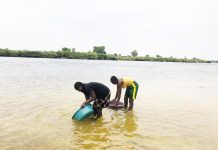Africa-Press – Namibia. A total of 6 844 diabetes cases were recorded across all age groups in the country during the 2024/2025 financial year.
This comprised of 6 345 adults, 377 children aged five to 17 years, and 122 children aged five and younger.
The Ministry of Health and Social Services noted that this represents a slight decline compared to 8,073 cases reported in 2023/2024, which recorded 5 950 adult, 646 adolescent, and 133 paediatric cases.
“Namibia is starting to witness a growing amount of diabetes among children and adolescents, and this is worrisome. I would like to highly emphasise the importance of an appropriate and healthy diet for children and adolescents,” said the line minister Esperance Luvindao at the commemoration of World Diabetes Day in Windhoek recently.
In a speech read on her behalf, she cautioned parents to avoid giving children sugary foods and snacks and to teach them the importance of drinking water.
“We must also encourage physical activities for children and adolescents in schools and at home to prevent obesity, as a risk factor for diabetes. Diabetes is not just a health issue; it is a development issue that affects productivity, family well-being, and national prosperity,” added Luvindao.
The day was commemorated under the theme: “Diabetes Across Life Stages, to
highlight the critical need for tailored diabetes care and prevention strategies that address the unique needs of individuals across their lifespan.
Luvindao said this is a call to action for individuals, families, communities, employers, and governments to work collaboratively to combat this growing health challenge.
The World Health Organisation (WHO) states that approximately 830 million people worldwide live with diabetes, with the majority residing in low-and middle-income countries.
In Namibia, nearly 7% of adults (around 90 000 people) are affected, highlighting the growing burden of noncommunicable diseases.
The Ministry of Health and Social Services said it continues to strengthen the national response through the adaptation of the WHO PEN Guidelines, the procurement and distribution of appropriate equipment and supplies, outpatient and inpatient care and management, and training of healthcare workers on early screening, prevention strategies, and management of diabetes to reduce diabetes-related morbidities, disabilities, and mortalities.
The WHO Package of Essential Noncommunicable Disease Interventions (PEN) provides a framework for managing noncommunicable diseases (NCDs) in primary health care, particularly in low-resource settings.
At the same occasion, WHO’s representative in Namibia, Richard Banda, said diabetes is on the rise everywhere, with the most significant and devastating increases occurring in developing nations.
“I know that diabetes is a significant public health challenge here in Namibia, with 6% of women and 7% of men being diabetic,” said the health specialist.
He noted that if this trend is not reversed, it will overwhelm health systems, strain the economy, and undermine the significant development achievements already made.
“Health systems must be resilient, adequately resourced and organised to deliver continuous care: from prevention and early diagnosis to effective treatment and life-long support,” said Banda.
For More News And Analysis About Namibia Follow Africa-Press






